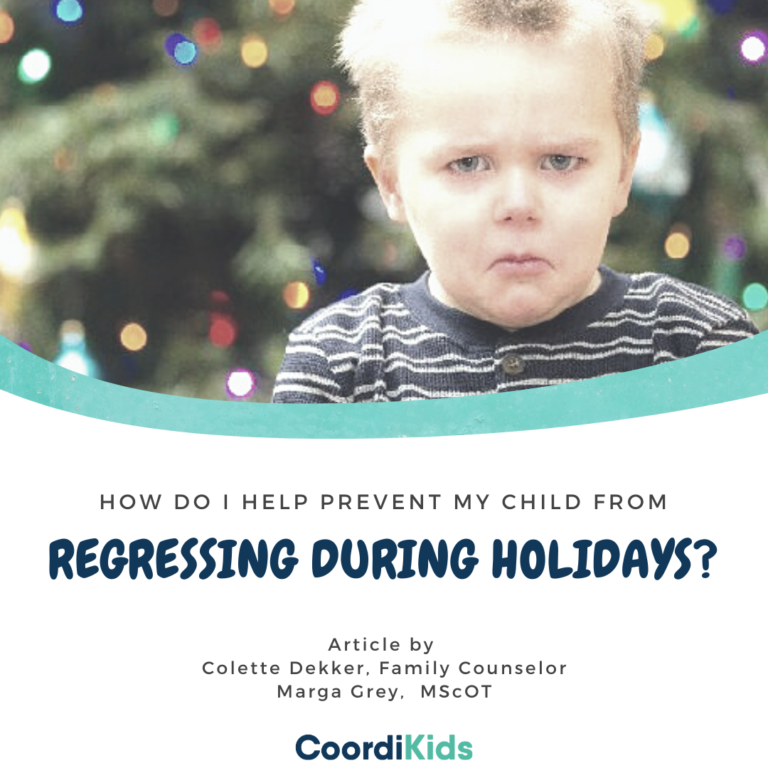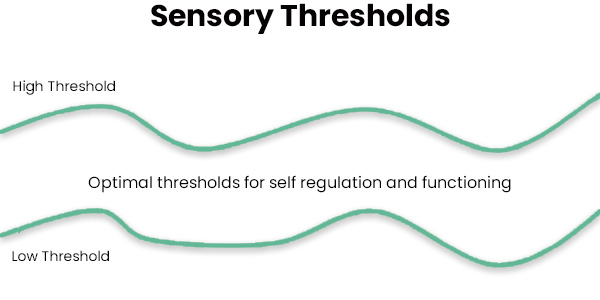General Information
Regression in Child Development – 5 Tips to help during the holidays not to overwhelm your child

Holidays are supposed to be a time of sentimental moments like passing down recipes and sharing stories in the kitchen while cooking family meals. But we all know what ends up happening along with all those memory-making moments…
Stress and bustling about, leading to regression in child development . Arguing over the right way to cook Grandma’s recipe. A constant flurry of dishwashing, running out of space, and spills. For children with some types of sensory disorders, holidays come with regular sensory overwhelm
For children with some types of sensory disorders, holidays come with regular sensory overwhelm.
This week, Marga and Colette from CoordiKids had a chat over coffee about the upcoming holiday season and how to start preparing parents to see possible regression in their children’s behaviour, emotions, and capabilities.
(Marga is a paediatric OT, and Colette is a family counselor – both specialise in working with children with sensory disorders. Each is available for virtual consultations through Telehealth.)
We’re sharing some of the highlights from that chat that we think all parents should bear in mind as we approach holiday season including points like:
- What holiday scenarios might trigger types of sensory disorders?
- How can parents plan ahead to include sensory lifestyle strategies that will reduce the likelihood of a child going into overwhelm or regression?
- What red flags can parents watch for that indicate your child needs you to step in and help them re-centre?
- What are some in-the-moment coping strategies for meltdowns?

What holiday scenarios might trigger types of sensory disorders?
Remember, parents, holidays include many types of disruption that can trigger children with different types of sensory disorders to act out, have meltdowns, or retreat internally.
For example:
Broken routines
😜
New foods
👃
New smells
👩👩👧👦
New people
👂
A flurry of sounds
👀
Lights and décor
How can parents plan to include sensory lifestyle strategies that will reduce the likelihood of a child going into overwhelm or regression?
- Plan sensory input throughout the day (Use a sensory lifestyle).
A sensory lifestyle is a way of incorporating the types of sensory-rich activities your child’s body and brain craves at regular intervals throughout the day. This helps prevent meltdowns.
Different types of sensory disorders cause the brain and body to seek different types of sensory input.
Some children need heavy sensory feedback – pressure on the joints, chewing, jumping, high levels of activity and stimulation. These children may struggle more with the lazy, quiet times when family is stretched out on the couch with a Christmas movie or waiting in line to see Santa. Their day should include regular periods of play and movement.
Plant 4-5 ‘movement breaks’ in which he can do jumps on the spot, reach up and touch toes 10 times, enjoy a chewy or crunchy snack, carry heavy objects around, or utilize a fidget toy when physical movement is limited.
Conversely, a child who tends to have low thresholds and is easily overwhelmed, their day should include periods of escape to an environment with very low stimulation.
4-6 times per day, she can go to a quiet, low-lit room where you give a deep-pressure massage with soft music and slow, rhythmic movements for 5 minutes. This helps her decompress.
- Give kids their own safe space.
One of the big things is making sure the kids have their own safe space. This doesn’t mean you’re removing them from the family for the whole day or letting them disappear to play their iPad for hours.
I just mean that children who stress easily need to have their own space to do what they want within during the periods of time they’re allowed to do so.
- Have a family schedule and schedule specific times to be with family – at least 2 hours a day.
You can do it all at once or an hour at a time or half hours. Those are scheduled times that your kids know they must be social and spend time with the rest of the family.
Outside of these scheduled times, yes, you can retreat to your safe haven and do whatever it is you like to do.
But it’s so important for families to spend quality time together. Play games. Play trivia.
-
- Prepare a few activities that inspire spontaneous creativity.
Being creative brings kids into mindfulness. Everyone knows how great mindfulness is, but you can’t just tell a kid, “Ok let’s be mindful now!” It doesn’t work like that.
But finding fun things to do that inspire spontaneous creativity bring our brains into a state of mindfulness without us really realizing it.
A fun game suggested by one of my teenagers is a sort of truth or dare game. We take turns guessing a number and then rolling a die. If you roll the number you guess, then you get to ask someone any question.
Start simple: What’s your favourite colour? If you were an animal, what would you be and why? If you were on a road trip but could only listen to one song over and over, what song would you pick?
It helps parents get to know their teenagers. It’s a fun way to get them to answer questions that they normally wouldn’t answer.
Apart from family time together, they start using imagination with this type of game. They get to use that creative part of their brain for a little while, which doesn’t get exercised much when they’re on the iPad all the time.
Another one we do is a gratitude journal.
We have one for everyone, even if it’s just a few pieces of paper that we’ve written the prompts on:
“I am grateful because:
I can…..
I am….
I have….”
We spend 10 minutes sitting together writing in our gratitude journal. They don’t have to read it aloud if they don’t want to, but usually we ask for a few volunteers.
-
-
- Keep the main parts of routines the same.
-
Holiday schedules are often spontaneous, so it’s not always realistic to stick to your normal routine. Staying up past bedtime or sleeping in late is a fun treat at holidays, but be aware that it may affect your little one the next day.
Otherwise, keep bedtime the same.
Keep a wake-up time. Make them complete a morning routine just as they would for school.
Keep mealtimes around the same time, rather than letting them graze and snack all day long.
Have a family game during the time your child would normally have after-school sport. Or allow them their screen time when they’d normally have it after school to decompress. This will help their bodies remain in a similar flow of decompression and exercise.

What red flags can parents watch for that indicate your child needs you to step in and help them re-centre?
If your little one is usually bubbly and cheerful, but she’s retreating to her room a lot or being quite shy, then you make a note to help her check in. She might need some silly time to pull her out of that withdrawn space.
Or if your son is being more aggressive or argumentative than usual, that is a good indication that he is past his threshold and cannot self-regulate.
Take note that your child is acting out. That’s attention-seeking, and it’s his or her way of saying, “Hey, mum & dad, I’m not ok. I need some positive attention.”
We tend to do a lot of negative attention during the holidays, you know, “Sit still. Help me with this. Stop whining.”
So take a moment to do something fun and attentive to your little guy, but keeping it calm.
What are some in-the-moment coping strategies for meltdowns?
Remove your child to a quiet, safe area to remove the stimulations that are upsetting your equilibrium.
Hold your child tightly against you and rock slowly.
Breathe deeply and slowly while looking into your child’s eyes so she can synchronize her breaths with yours.
Go for a walk together to talk while the body starts to relax.
Use the How Do You Feel regulation strategy to help kids to identify how they feel and to help them to feel when a meltdown is building up. Taking a moment to communicate clearly about your child’s emotions and physical sensations can often help them take control of themselves again.
Pingback: Is clumsiness a sign of ADHD
Pingback: Which Fine Motor Skill is Most Sophisticated and Develops Last